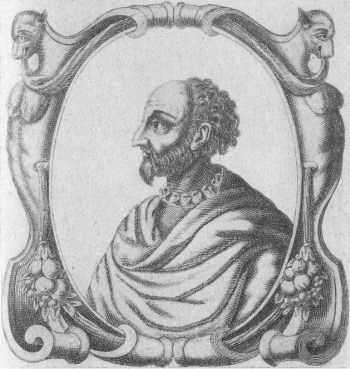- Jean-Antoine de Baïf
Infobox Writer
name = Jean Antoine de Baïf

imagesize = 250px
birthdate = birth date|1532|02|19
deathdate = death date and age|1589|09|19|1532|02|19
occupation =poet
nationality = FrenchJean Antoine de Baïf (
February 19 ,1532 -September 19 ,1589 ) was a Frenchpoet and member of the "Pléiade".Life
He was born in
Venice , the natural son of the scholarLazare de Baïf , who was at that time French ambassador at Venice. Thanks, perhaps, to the surroundings of his childhood, he grew up an enthusiast for thefine arts , and surpassed in zeal all the leaders of theRenaissance in France. His father spared no pains to secure the best possible education for his son. The boy was taughtLatin byCharles Estienne , and Greek byAnge Vergèce , the Cretan scholar and calligraphist who designed Greek types for Francis I.When he was eleven years old he was put under the care of the famous
Jean Daurat . Ronsard, who was eight years his senior, now began to share his studies.Claude Binet tells how young Baïf, bred on Latin and Greek, smoothed out the tiresome beginnings of the Greek language for Ronsard, who in return initiated his companion into the mysteries of French versification.Baïf possessed an extraordinary facility, and the mass of his work has injured his reputation. Besides a number of volumes of short poems of an amorous or congratulatory kind, he translated or paraphrased various pieces from
Bion ,Moschus ,Theocritus , Anacreon,Catullus andMartial . He resided inParis , and enjoyed the continued favor of the court. In 1570, in conjunction with the composerJoachim Thibault de Courville , with royal blessing and financial backing, he founded the "Académie de musique et de poésie ", with the idea of establishing a closer union between music and poetry; his house became famous for the concerts which he gave, entertainments which Charles IX and Henry III frequently attended. Composers such asClaude Le Jeune , who was to become the most influential musician in France in the late 16th century, andJacques Mauduit , who carried the Academie's ideas into the 17th century, soon joined the group, which remained secretive as to its intents and techniques.Works
Baïf elaborated a system for regulating French versification by quantity, a system which came to be known as "vers mesurés", or "vers mesurés à l'antique". In the general idea of regulating versification by quantity, he was not a pioneer.
Jacques de la Taille had written in 1562 the "Maniére de faire des vers en français comme en grec et en Latin" (printed 1573), and other poets had made experiments in the same direction; however, in his specific attempt to recapture the ancient Greek and Latin ethical effect of poetry on its hearers, and in applying the metrical innovations to music, he created something entirely new.Baïf's innovations also included a line of 15 syllables known as the "vers Baïfin". He also meditated reforms in French spelling.
His theories are exemplified in "Etrenes de poezie Franzoeze an vers mezures" (1574). His works were published in 4 volumes, entitled "Œuvres en rime" (1573), consisting of "Amours, Jeux, Passetemps, et Poemes", containing, among much that is now hardly readable, some pieces of infinite grace and delicacy. His
sonnet on the "Roman de la Rose " was said to contain the whole argument of that celebrated work, and Colletet says it was on everybody's lips.He also wrote a celebrated sonnet in praise of the
St. Bartholomew's Day Massacre . Baïf was the author of two comedies, "L'Eunuque", 1565 (published 1573), a free translation ofTerence 's "Eunuchus ", and "Le Brave" (1567), an imitation of the "Miles Gloriosus ", in which the characters ofPlautus are turned into Frenchmen, the action taking place atOrléans . Baïf published a collection of Latin verse in 1577, and in 1576 a popular volume of "Mimes, enseignemens et proverbes".References
* The article is available [http://www.1911encyclopedia.org/Jean_Antoine_De_Baif here] .
* The "Œuvres en rime" (5 vols., 1881-1890) of J. A. de Baïf form part of the "Pléiade française" ofCharles Marty-Laveaux
*Becq de Fouquières , "Poésies choisies de J. A. de Baïf" (1874), with a valuable introduction
*F. Brunetière , "Hist. de langue française classique" (1904, bk. iii. pp. 398-422)
Wikimedia Foundation. 2010.
